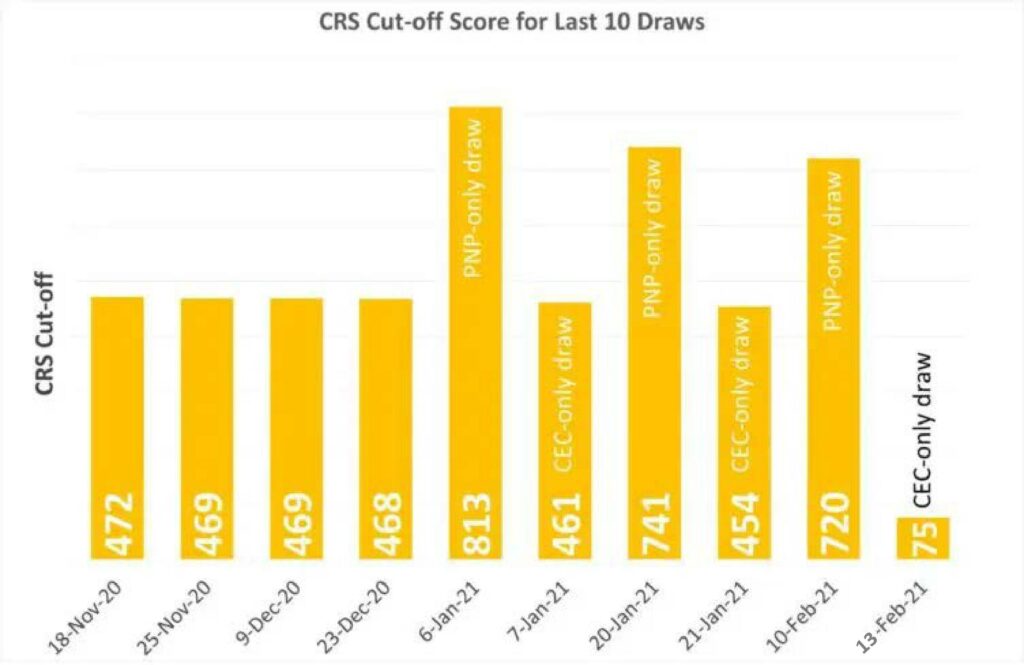Introduction
Canada’s latest Express Entry draw came in record-breaking at over 27k to invite people to apply for permanent residence. This is a huge jump from the prior draw, which only reached 5k by comparison. The Canadian government’s Immigration Levels Plan aims to take this even further by planning a target of a whopping 401k new residents by the end of 2021 by focusing on current Canadian residents.
The Immigration, Refugees, and Citizenship Canada (IRCC) is the ultimate authority on Canadian immigration at a federal level. They claim that the massive turnout is because the vast majority of candidates were already living in Canada when COVID started, and thus were less prone to immigration obstacles.
Who Will These Candidates Be?
The latest applicants from the historic draw are at the forefront, and they are mainly skilled candidates with at least one year of Canadian work experience. The second most prominent group is the other Express Entry applicants, those who have foreign work experience. The remaining numbers will come from immigrants of economic, family, and refugee/humanitarian classes.
How Does the Entry Process Work?
In order to become a permanent Canadian resident, applicants must meet a set of requirements. Each person has a profile that is ranked on the Comprehensive Ranking System (CRS), which allots points that determine eligibility in the entry pool. These points are earned based off of:
- Skills
- Education
- Work experience
- Other factors, such as validated offer of employment in Canada

This most recent draw on February 13, 2021 had the lowest-ever minimum score of 75.
The IRCC aims to accept over 100k immigrants through the Express Entry program this year by the issuance of at least 5k Invitations to Apply (ITAs). The draws will typically be held on a bi-weekly basis (there are always exceptions to the rule), and there have already been upwards of 40k ITAs so far. These invitations are a requirement in order to become a permanent resident.
The Canadian Experience Class (CEC) program serves as a platform for international students and temporary foreign workers who are seeking permanent residency from within Canada.
What Special Efforts Can Be Made to Meet the Targets?
There are a plethora of Canadian programs and establishments that assist with immigration. They offer solutions for all of the targeted class groups that could potentially expedite the process of becoming a permanent resident, which can take up to six months. However, given the scale of the IRCC’s targets, leniency is being given to allow for more entries.
Because the target requirements for immigrants in the family and refugee/humanitarian class are so high, the IRCC will need to make special considerations:
- Spousal applications will be expedited, as they represent the majority of the family class
- A potential resolution for the refugees would be to establish a pathway for those with Canadian work experience within pre-established programs to permanent residency
- Programs for “guardian angels”—asylum claimants who work on the COVID frontlines—have already been set in place
The Provincial Nominee Program (PNP) is the second most popular way to immigrate as a skilled worker. The IRCC is proposing to increase the program’s funding and extend an invitation to as many people as possible that are already in Canada.
The Atlantic Immigration Pilot (AIP) is a speedy immigration program that lets employers in Canada’s four Atlantic provinces (Nova Scotia, New Brunswick, Newfoundland, and Labrador and Prince Edward Island) to hire foreigners for jobs that they haven’t been able to fill locally. With the exception of this program, most others can take over six months.

Conclusion
Canada’s big aspirations towards immigration targets have taken a major hit due to the pandemic. As a result, many policies and practices have been adjusted to meet the needs of new Express Entry candidates in order to expedite the immigration process. Thus far it has been successful, and it is projected to increase throughout the year.
Though most of the people who will be used to meet the quota already reside in the country, they are still looking for applicants from overseas. These potential applicants have qualities that Canada is seeking to support its social and economic goals, so it is prudent to admit as many as possible.
The government recommends that overseas candidates apply as soon as possible, as the IRCC has a history of resuming ITAs abruptly. The most important thing is to do your research and connect with a right immigration professional to find the most effective way to become a permanent resident that works for your traits and qualifications.
 Please refer to our LinkedIn page to get access to online webinars or articles posted on the most recent Canadian immigration updates. To discuss the details of your situation, please reach out to our office and we will gladly assist you.
Please refer to our LinkedIn page to get access to online webinars or articles posted on the most recent Canadian immigration updates. To discuss the details of your situation, please reach out to our office and we will gladly assist you.

